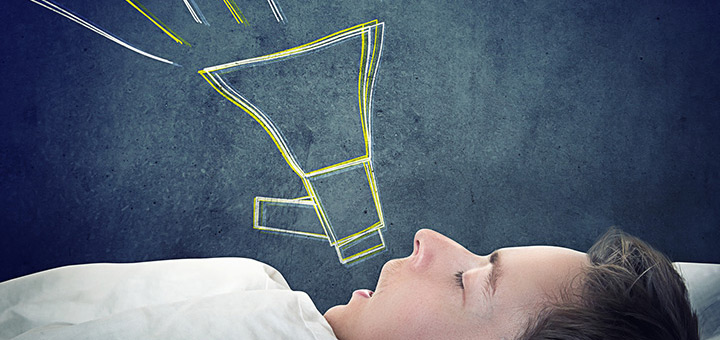Snoring is a common cause of daytime fatigue (for the snorer and their partner). Men are more likely to snore but it is still common amongst women and children. As well as not feeling fully rested during the day, snorers are more likely to be involved in car accidents – a clear indicator that poor quality sleep due to snoring is affecting your concentration and ability to perform.
There are several reasons why we snore. Inflammation of the airways due to a cold, blocked sinuses or an allergic reaction can cause temporary snoring. Structural causes such as neck length, big tonsils and jaw shape may predispose one to snoring too. Being overweight and smoking (as it irritates the airways) greatly increase your chances of being a chronic snorer. The rattling sound made be snorers is often created by the vibration of overly-relaxed muscles and tissues in the throat. Again there may be several reasons for this lazy muscle tone (eg genetic) but posture and poor neck function are possible candidates.
I’ve noticed that my patients who come to me for relief from painful stiff necks also complain of snoring or poor quality sleep. Once their pain is relieved and they have regained a fuller, freer range of motion in their neck (instantly improving their posture), these same patients comment that their snoring is also often reduced. It’s an area ripe for further research but there has already been a study on 138 sufferers of a more serious snoring condition which found a positive correlation between spinal problems in the upper neck and obstructive sleep apnoea syndrome (1).
If ignored, snoring can develop into the more serious condition of sleep apnoea. Whilst snoring is the vibration of your airways as they are partially obstructed, sleep apnoea is the complete closure of your throat for seconds at a time whilst you are asleep. As your brain and body is deprived of oxygen your survival system kicks in and wakes you up gasping for air. This can occur many times in a single night (often without you remembering it in the morning) leading to a feeling of grogginess, fatigue and, sometimes, a bad headache upon waking.
Apart from making you feel tired all day and with poor concentration and energy levels, sleep apnoea can have serious ramifications for health. It is linked to high blood pressure, increased risk of strokes and heart attacks, impotency, memory problems and chronic headaches. If you feel or are told by your partner that you are regular snorer, ask them to note down the pattern of your snoring, what position you are sleeping in as you snore and if you appear to stop breathing during the night. If you have a cold, hayfever or inflamed sinuses then over the counter nasal strips which hold your nasal passages open may help a temporary bout of snoring. They won’t make any difference to snoring caused by relaxed throat muscles or neck problems.
How To Reduce Snoring
- Avoid alcohol and other central nervous system depressants such as pain killers, muscle relaxants and sedatives.
- Stop smoking
- Losing those extra pounds will also help reduce snoring as well as dramatically improving your overall health levels.
- Sleep on your side – this helps stop the throat muscles collapsing during the night and triggering snoring. (To help avoid low back problems, place a slim pillow between your knees when you sleep on your side)
- Don’t prop yourself up with lots of pillows as this will only push your chin onto your chest and make snoring more likely.
- Some people find elevating their bed head slightly with books under the legs can help relieve mild snoring.
If you have poor posture or a painful stiff neck then you may find that gentle chiropractic treatment will not only help tackle your neck pain but it could relieve your snoring too.If you feel that you stop breathing for short periods during the night (a common symptom is waking up gasping for breath) then it’s important that you see your GP. They can discuss a range of options with you including devices to hold your jaw in a certain position, sprays, surgery and the use of continuous positive air pressure machines – these blow pressurised air through a face mask to keep the throat open as you sleep.
References (1) Dobson G, et al (1999). Cervical angles in sleep apnea patients: a retrospective study. Journal of Vertebral Subluxation Research, 3(1):9-23.

